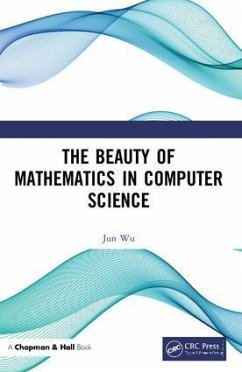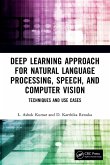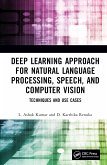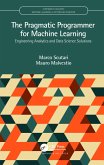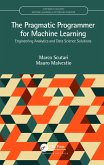Jun Wu
The Beauty of Mathematics in Computer Science
Jun Wu
The Beauty of Mathematics in Computer Science
- Broschiertes Buch
- Merkliste
- Auf die Merkliste
- Bewerten Bewerten
- Teilen
- Produkt teilen
- Produkterinnerung
- Produkterinnerung
A series of essays introducing the applications of machine learning and statistics in natural language processing, speech recognition and web search for non-technical readers
Andere Kunden interessierten sich auch für
![Deep Learning Approach for Natural Language Processing, Speech, and Computer Vision Deep Learning Approach for Natural Language Processing, Speech, and Computer Vision]() L. Ashok Kumar (India PSG College of Technology)Deep Learning Approach for Natural Language Processing, Speech, and Computer Vision71,99 €
L. Ashok Kumar (India PSG College of Technology)Deep Learning Approach for Natural Language Processing, Speech, and Computer Vision71,99 €![Deep Learning Approach for Natural Language Processing, Speech, and Computer Vision Deep Learning Approach for Natural Language Processing, Speech, and Computer Vision]() L. Ashok Kumar (India PSG College of Technology)Deep Learning Approach for Natural Language Processing, Speech, and Computer Vision182,99 €
L. Ashok Kumar (India PSG College of Technology)Deep Learning Approach for Natural Language Processing, Speech, and Computer Vision182,99 €![Cybersecurity Analytics Cybersecurity Analytics]() Rakesh M. Verma (University of Houston, Texas, USA)Cybersecurity Analytics68,99 €
Rakesh M. Verma (University of Houston, Texas, USA)Cybersecurity Analytics68,99 €![Green Computing in Network Security Green Computing in Network Security]() Green Computing in Network Security156,99 €
Green Computing in Network Security156,99 €![The Pragmatic Programmer for Machine Learning The Pragmatic Programmer for Machine Learning]() Marco Scutari (Istituto Dalle Molle)The Pragmatic Programmer for Machine Learning65,99 €
Marco Scutari (Istituto Dalle Molle)The Pragmatic Programmer for Machine Learning65,99 €![The Pragmatic Programmer for Machine Learning The Pragmatic Programmer for Machine Learning]() Marco Scutari (Istituto Dalle Molle)The Pragmatic Programmer for Machine Learning96,99 €
Marco Scutari (Istituto Dalle Molle)The Pragmatic Programmer for Machine Learning96,99 €![Graph Learning and Network Science for Natural Language Processing Graph Learning and Network Science for Natural Language Processing]() Graph Learning and Network Science for Natural Language Processing66,99 €
Graph Learning and Network Science for Natural Language Processing66,99 €-
-
-
A series of essays introducing the applications of machine learning and statistics in natural language processing, speech recognition and web search for non-technical readers
Produktdetails
- Produktdetails
- Verlag: Taylor & Francis Ltd
- Seitenzahl: 284
- Erscheinungstermin: 5. November 2018
- Englisch
- Abmessung: 231mm x 155mm x 15mm
- Gewicht: 450g
- ISBN-13: 9781138049604
- ISBN-10: 1138049603
- Artikelnr.: 54088487
- Herstellerkennzeichnung
- Libri GmbH
- Europaallee 1
- 36244 Bad Hersfeld
- gpsr@libri.de
- Verlag: Taylor & Francis Ltd
- Seitenzahl: 284
- Erscheinungstermin: 5. November 2018
- Englisch
- Abmessung: 231mm x 155mm x 15mm
- Gewicht: 450g
- ISBN-13: 9781138049604
- ISBN-10: 1138049603
- Artikelnr.: 54088487
- Herstellerkennzeichnung
- Libri GmbH
- Europaallee 1
- 36244 Bad Hersfeld
- gpsr@libri.de
Jun Wu was a staff research scientist in Google who invented Google's Chinese, Japanese, and Korean Web Search Algorithms and was responsible for many Google machine learning projects. He wrote official blogs introducing Google technologies behind its products in very simple languages for Chinese internet users from 2006-2010. The blogs had more than two million followers. He received Ph.D. in computer science from the Johns Hopkins University and had been working on speech recognition and natural language processing for more than 20 years. He was one of the earliest engineers of Google, managed many products of the company, and was awarded more than ten US patents during his ten-year tenure there. He became a full-time VC investor and co-founded Amino Capital in Palo Alto in 2014 and is the author of eight books.
Words, languages vs. numbers, information. Natural language processing:
from rules to statistics. Statistical language models. Chinese, Japanese,
and Korean Word segmentation. Hidden Markov models. Measurement and usage
of information. Fred Jelinek and modern natural language processing. Beauty
of simplicity: Boolean algebra and search engines. Graph theory and web
crawlers. PageRank-Google's democratic ranking algorithm. Determing the
relevance of webpages and queries. Finite state machines and dynamic
programming: Core technologies of Google local search. Cosine similarity
and news classification. Matrix calculation and clustering of text
documents. Information fingerprints and their applications. Mathematical
principles of cryptography. All that is gold does not glitter: search
engine anti-SPAM. The importance of mathematical models. Don't put all your
eggs in one basket: maximum entropy modeling. The principle of (Chinese
pinyin) input method editor. Bloom filter. Bayesian networks: Extensions of
hidden Markov models. Conditional random field, syntactic parsing, and
other applications. Viterbi and his algorithm. God algorithm:
Expectation-maximization algorithms. Logistic regression and web search
advertisement. Divide and conquer and Google cloud computing fundamentals.
Google Brain and neural networks. The power of big data.
from rules to statistics. Statistical language models. Chinese, Japanese,
and Korean Word segmentation. Hidden Markov models. Measurement and usage
of information. Fred Jelinek and modern natural language processing. Beauty
of simplicity: Boolean algebra and search engines. Graph theory and web
crawlers. PageRank-Google's democratic ranking algorithm. Determing the
relevance of webpages and queries. Finite state machines and dynamic
programming: Core technologies of Google local search. Cosine similarity
and news classification. Matrix calculation and clustering of text
documents. Information fingerprints and their applications. Mathematical
principles of cryptography. All that is gold does not glitter: search
engine anti-SPAM. The importance of mathematical models. Don't put all your
eggs in one basket: maximum entropy modeling. The principle of (Chinese
pinyin) input method editor. Bloom filter. Bayesian networks: Extensions of
hidden Markov models. Conditional random field, syntactic parsing, and
other applications. Viterbi and his algorithm. God algorithm:
Expectation-maximization algorithms. Logistic regression and web search
advertisement. Divide and conquer and Google cloud computing fundamentals.
Google Brain and neural networks. The power of big data.
Words, languages vs. numbers, information. Natural language processing:
from rules to statistics. Statistical language models. Chinese, Japanese,
and Korean Word segmentation. Hidden Markov models. Measurement and usage
of information. Fred Jelinek and modern natural language processing. Beauty
of simplicity: Boolean algebra and search engines. Graph theory and web
crawlers. PageRank-Google's democratic ranking algorithm. Determing the
relevance of webpages and queries. Finite state machines and dynamic
programming: Core technologies of Google local search. Cosine similarity
and news classification. Matrix calculation and clustering of text
documents. Information fingerprints and their applications. Mathematical
principles of cryptography. All that is gold does not glitter: search
engine anti-SPAM. The importance of mathematical models. Don't put all your
eggs in one basket: maximum entropy modeling. The principle of (Chinese
pinyin) input method editor. Bloom filter. Bayesian networks: Extensions of
hidden Markov models. Conditional random field, syntactic parsing, and
other applications. Viterbi and his algorithm. God algorithm:
Expectation-maximization algorithms. Logistic regression and web search
advertisement. Divide and conquer and Google cloud computing fundamentals.
Google Brain and neural networks. The power of big data.
from rules to statistics. Statistical language models. Chinese, Japanese,
and Korean Word segmentation. Hidden Markov models. Measurement and usage
of information. Fred Jelinek and modern natural language processing. Beauty
of simplicity: Boolean algebra and search engines. Graph theory and web
crawlers. PageRank-Google's democratic ranking algorithm. Determing the
relevance of webpages and queries. Finite state machines and dynamic
programming: Core technologies of Google local search. Cosine similarity
and news classification. Matrix calculation and clustering of text
documents. Information fingerprints and their applications. Mathematical
principles of cryptography. All that is gold does not glitter: search
engine anti-SPAM. The importance of mathematical models. Don't put all your
eggs in one basket: maximum entropy modeling. The principle of (Chinese
pinyin) input method editor. Bloom filter. Bayesian networks: Extensions of
hidden Markov models. Conditional random field, syntactic parsing, and
other applications. Viterbi and his algorithm. God algorithm:
Expectation-maximization algorithms. Logistic regression and web search
advertisement. Divide and conquer and Google cloud computing fundamentals.
Google Brain and neural networks. The power of big data.

